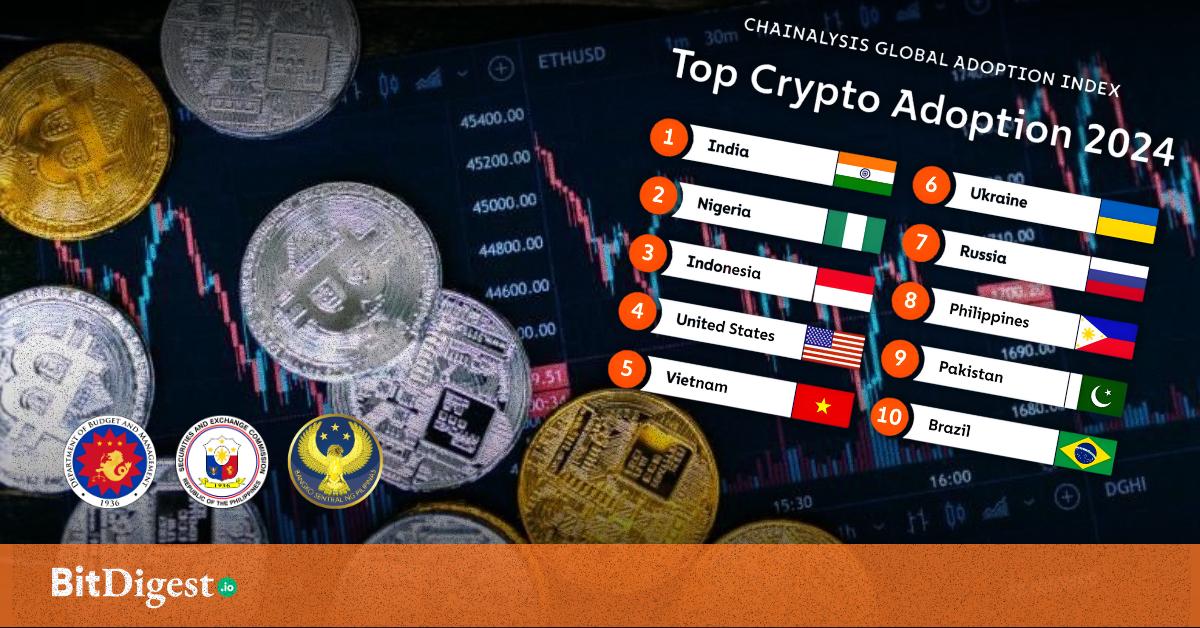Why the Philippines Needs a Unified Strategy for Blockchain and Digital Assets
The Philippines is no stranger to digital asset adoption. Ranked 8th globally in the 2024 Chainalysis Crypto Adoption Index, the country has shown strong grassroots interest in crypto, DeFi, and blockchain-based platforms. An estimated 13.4% of Filipinos already own cryptocurrency, using it for everything from play-to-earn gaming to remittances.
But while citizen interest is growing, the country’s governance strategy is still catching up. Web3 adoption in the Philippines has been largely organic, with minimal coordination between agencies and no unified national roadmap. This gap between rapid user adoption and policy preparedness could create systemic risks and missed opportunities in the years ahead.
The Risk of Fragmentation Without a National Policy
Several agencies have already initiated pilots and regulations. The Department of Budget and Management (DBM) explored blockchain for budget transparency. The Bangko Sentral ng Pilipinas (BSP) regulates Virtual Asset Service Providers (VASPs). The Securities and Exchange Commission (SEC) recently released rules for Crypto-Asset Service Providers (CASPs).
Yet these efforts remain largely siloed. Without an overarching strategy, they risk producing duplicated processes, inconsistent standards, and unclear consumer protection mechanisms. Fragmentation also makes it harder to measure outcomes, coordinate innovation, or integrate international best practices. In short: the whole is not yet greater than the sum of its parts.
What a National Strategy Could Look Like
A forward-looking Web3 strategy would go beyond regulation. It would unify, guide, and future-proof the country’s digital asset ecosystem.
Key components could include:
- Inter-agency Coordination: Formalize collaboration between key departments like Finance, BSP, SEC, DICT, DTI, and NEDA under a central council.
- Periodic Roadmapping: Require the drafting of a national tokenization roadmap every three years to align public-private goals.
- Inclusive Governance: Involve civil society, OFW and retail investor representatives, and Web3 industry stakeholders in policymaking.
- Regulatory Sandboxes: Support experimentation through sandbox programs for DeFi, stablecoins, and tokenized public-private projects.
- Education and Consumer Protection: Allocate funding for financial literacy campaigns and enforce high standards for platform accreditation and transparency.
These aren’t speculative ideas. They mirror successful frameworks like the EU’s MiCA regulation, Singapore’s MAS-led governance, and the UAE’s national blockchain strategy.
Why It Matters Now
The urgency is no longer in test or contemplation, Southeast Asia’s digital economy is projected to hit $1 trillion by 2030. Countries like Vietnam, Singapore, and the UAE are already executing comprehensive strategies to attract foreign direct investment (FDI), retain top talent, and build globally competitive digital finance hubs.
Meanwhile, the Philippines risks being seen as uncoordinated—despite its talent pool, tech-savvy population, and rising crypto adoption. Without policy clarity, we may see innovators and capital migrating to more stable jurisdictions.
A well-defined strategy could instead position the country as a regional blockchain innovation hub; generating jobs in tech, finance, and compliance, while protecting the integrity of our financial system.
Blockchain and digital assets will not wait for policymakers to catch up. The pace of innovation demands proactive governance, not reactive enforcement. A national strategy doesn’t mean endorsing every aspect of crypto, it means enabling safe experimentation while ensuring consumer safety and system stability.
To do this right, the Philippines must look both inward and outward: listening to its citizens, empowering developers, and learning from global benchmarks. We already have the ingredients. What’s missing is the coordination to turn them into a sustainable digital economy. A national Web3 playbook won’t just help the Philippines regulate better. It will help us build smarter, attract innovation, and secure our place in the global digital economy. The time to coordinate, legislate, and educate is now.
.svg)


.svg) SHARE TO FACEBOOK
SHARE TO FACEBOOK SHARE TO TWITTER/X
SHARE TO TWITTER/X SHARE TO LINKEDIN
SHARE TO LINKEDIN SEND TO MAIL
SEND TO MAIL


.svg)


.svg)